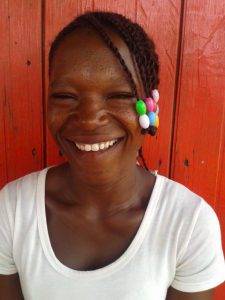ATE’s Special Needs Awareness Programme (SNAP), provides education and support for children with disabilities and their families. In Ghana disability is not often discussed in terms of diagnosis but Patience explains that when her daughter, Michelle, was 3 years old she still could not walk or talk. It was difficult to take her daughter out while she was working, selling snacks, because when she was with her people wouldn’t come and buy from her.
When she first brought her daughter to the SNAP group meeting she realised that she was actually in a better situation than some of the other children who attend. Through SNAP workshops Patience felt empowered to learn that disabled children are not cursed and that disability can affect anyone. She learnt that disabled children should not be neglected, they should rather be supported to lead full and happy lives and she was encouraged to start teaching her daughter how to walk. She started giving her exercises every morning and she made amazing progress. Michelle is now seven years old, and Patience beams that “she wobbles all over but she can walk!” She goes to school, she knows her alphabet and she is learning how to write.
Patience used to feel heavy stigmatisation because of her daughter’s disability. When selling at her stall and she put Michelle on the mat beside her it would create a scene as people would want to come and stare at her. They would say that she is not human – she is a demon. She describes how someone once showed her a particular bush where she was advised to leave her daughter for 7 days to “cure” her. Patience doesn’t believe in the traditional beliefs which lead to mistreatment and harm, but sadly one of her friends struggled to stand up to the stigma and poisoned her own child. The next baby that she gave birth to had an even worse condition but with support through SNAP she found the strength to care for her as best she can.
“SNAP enables us to discuss the stigmatisation that we face” and be bold enough to share and speak out about some of these experiences. Patience explains that even travelling to SNAP meetings once a month can be a struggle, not only because of some of the children’s lack of mobility, but other passengers won’t always allow the families and their disabled children to join them on the tro-tro or nyaba. The question of how they would attend was a problem, they felt rejected and stigmatised and without their own transport it discouraged people from coming regularly until ATE provided a nyaba to collect some members travelling together from a distance which the children love.
For Patience, SNAP helps the families with disabled children to be stronger in spite of the discrimination and to stay strong in spite of their struggles and to see their children for the gifts that they are.
Patience really enjoys the interactive aspect of SNAP.  She explains that parents have been encouraged to interact with their children more, shown ways of communicating with their children who cannot talk, and encouraged to find things to stimulate and engage them. The education sessions have helped the parents and carers to be more patient with their children, to recognise the importance of looking after their children’s health and how to manage their hygiene. Workshops with local health teams have provided information on a range of issues for parents and carers including better understanding of care for themselves.
She explains that parents have been encouraged to interact with their children more, shown ways of communicating with their children who cannot talk, and encouraged to find things to stimulate and engage them. The education sessions have helped the parents and carers to be more patient with their children, to recognise the importance of looking after their children’s health and how to manage their hygiene. Workshops with local health teams have provided information on a range of issues for parents and carers including better understanding of care for themselves.
“The food also really helps, as sometimes you can see from the parents’ faces that they are hungry”. Some of them really struggle with food and basic provisions. You can see that some children need more support than others because of their conditions but there are those who are orphaned and being raised by their grandparents that are also particularly needy.
Patience has her own successful small business which she has received support from ATE to grow, which you can read about, here – https://ateghana.org/patience-vorinye/
Other case studies of women with disabled children who have benefited from SNAP and our small business grants will be uploaded over the coming weeks.